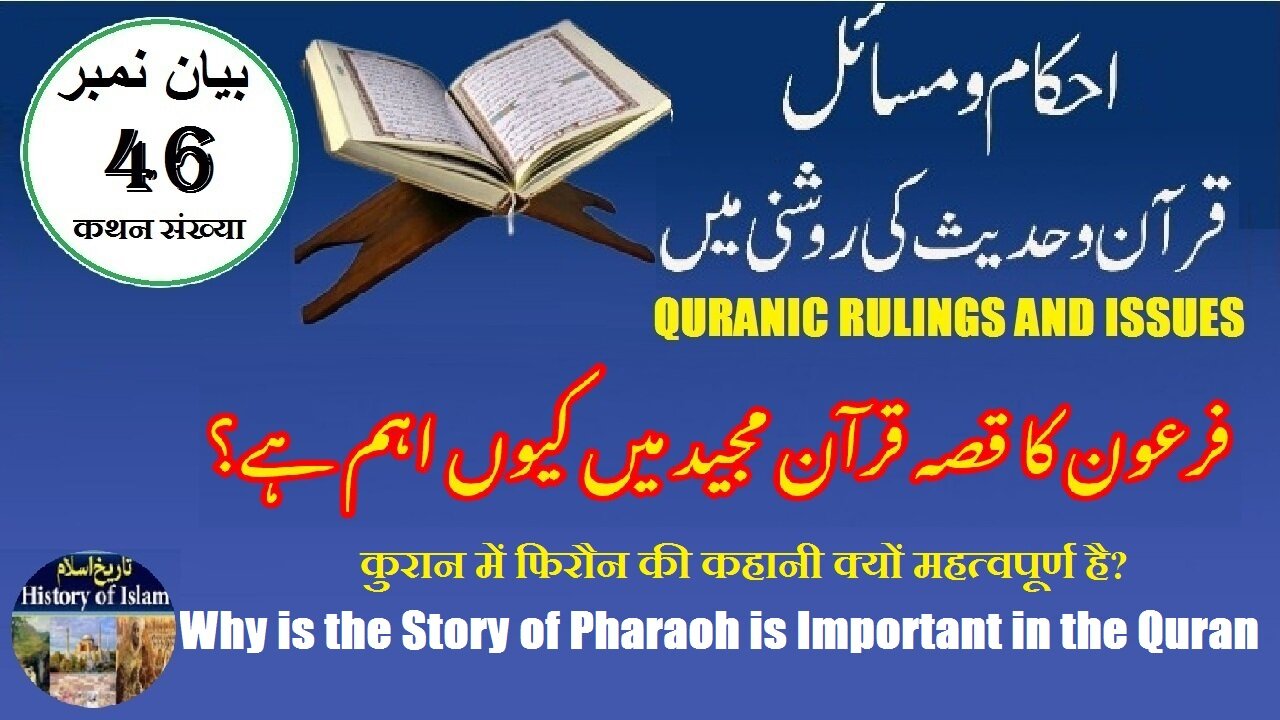Premium Only Content

Why is the Story of Pharaoh is Important in the Quran | فرعون کی کہانی قرآن میں کیوں اہم ہے؟
@islamichistory813 #story #pharaoh #highlighted #important #quran #islamicbayan #seriesofstatement #statement46 #bayan46
Why is the Story of Pharaoh Highlighted as Important in the Quran?
Assalamu Alaikum sisters, brothers, friends and elders:
We welcome you to Statement Number 46 in our series of statements. We will explain in it that: (Why is the Story of Pharaoh Highlighted as Important in the Quran? ), our aim is to learn and teach from the Quran and Sunnah, reflect on history and seek solutions to problems with divine guidance.
The Quran is not merely a book of history, but a timeless guide for humanity. Among the stories it highlights repeatedly is the story of Pharaoh, the tyrant of Egypt during the time of Prophet Musa peace be upon him. This story is mentioned in various places throughout the Quran, not to narrate past events only, but to deliver deep lessons for all generations. The repeated mention of Pharaoh’s arrogance, his denial of truth, and his downfall carries moral, spiritual, and political guidance for Muslims and for humanity at large.
The story of Pharaoh is important because it demonstrates the consequences of pride, oppression, and rebellion against Allah. It reminds us that no matter how much power or authority a person may gain, if he stands against the truth, he is destined for destruction. Allah says in the Quran, “Indeed, Pharaoh exalted himself in the land and divided its people into factions, oppressing a sector among them, slaughtering their sons and keeping their women alive. Indeed, he was of the corrupters” (Surah Al-Qasas 28:4). This verse shows that Pharaoh misused power, sowed division, and committed injustice, which made him an eternal example of tyranny.
Another reason the Quran highlights Pharaoh is to give strength to the believers in times of hardship. The Children of Israel were oppressed under Pharaoh’s rule, yet Allah eventually rescued them. This gives hope that no matter how powerful an oppressor may seem, the help of Allah is near. Allah says, “So We took him and his soldiers and threw them into the sea. So see how was the end of the wrongdoers” (Surah Al-Qasas 28:40). This demonstrates that the oppressor, no matter how mighty, cannot escape the grip of Allah.
The story also warns against arrogance in denying the signs of Allah. Pharaoh witnessed the miracles of Musa peace be upon him, such as the staff turning into a serpent and the parting of the sea, yet his arrogance blinded him. The Quran says, “And they rejected them, while their souls were convinced thereof, out of injustice and arrogance. So see how was the end of the corrupters” (Surah An-Naml 27:14). This indicates that disbelief often comes not from ignorance but from arrogance and pride.
Furthermore, the Quran presents Pharaoh as a symbol of those who claim divinity or absolute authority. He declared to his people, “I am your Lord, Most High” (Surah An-Nazi’at 79:24). This statement reflects extreme arrogance and the rejection of Allah’s supremacy. His downfall serves as a clear reminder that no human being has the right to claim lordship or absolute control over others. This message is especially relevant in times where leaders and rulers sometimes misuse authority.
The story of Pharaoh also emphasizes the importance of standing firm in faith even when facing oppression. Prophet Musa peace be upon him confronted Pharaoh with courage and patience despite the threats he faced. Allah says, “Go to Pharaoh, for indeed he has transgressed. But speak to him with gentle speech that perhaps he may be reminded or fear Allah” (Surah Taha 20:43-44). This teaches Muslims that da’wah, or calling to the truth, must be done with wisdom, patience, and gentleness even when addressing tyrants.
Hadith literature also highlights the significance of Pharaoh’s example. In Sahih Muslim, it is narrated that the Prophet Muhammad peace be upon him said: “On the Day of Judgment, the most severely punished person will be Pharaoh” (Sahih Muslim, Hadith 2856). This shows that his punishment in the Hereafter is a warning for all who follow his path of arrogance and oppression.
The Quran also narrates Pharaoh’s end in detail, where he attempted to believe at the last moment, but his repentance was not accepted. Allah says, “Until, when drowning overtook him, he said, ‘I believe that there is no deity except that in whom the Children of Israel believe, and I am of the Muslims.’ Now? And you had disobeyed before and were of the corrupters” (Surah Yunus 10:90-91). This illustrates that repentance must come before death approaches, and delaying belief until the final moment is of no use.
The story is also highlighted to remind humanity of Allah’s justice. Pharaoh was a symbol of oppression, while Musa peace be upon him was a symbol of truth and liberation. Their confrontation reflects the eternal struggle between falsehood and truth. Allah assures that truth will ultimately prevail, no matter how long falsehood seems to dominate. “And We wanted to confer favor upon those who were oppressed in the land and make them leaders and make them inheritors” (Surah Al-Qasas 28:5). This verse provides hope to the oppressed that Allah’s justice will always manifest.
In summary, the story of Pharaoh is highlighted in the Quran because it represents timeless lessons of faith, patience, justice, and the dangers of arrogance. It is not merely a tale of the past but a living reminder for humanity. Pharaoh’s story warns oppressors of the inevitable consequences of their actions and assures the oppressed that Allah’s help is always near. It teaches believers to remain firm in faith, to avoid arrogance, and to uphold justice in society.
The Quran repeats this story in different chapters to strengthen the hearts of the believers and to remind them that the path of truth is often met with opposition, but the ultimate victory belongs to Allah and His servants. The fall of Pharaoh is not just a historical event; it is a divine message for every age and every nation.
We conclude today's discussion with this humble supplication: O Allah, purify our hearts, accept our deeds, forgive our sins, and include us among Your grateful servants. Amen
Allah Hafiz
#qurantafseer #hadithlessons #ilmdeen #quranwisdom #rozanabayan #sunnahteachings #imanibaatain #islamicknowledge #masailkaahal #quranstories #deenreminder #hadithseikhtalat #islamicsolutions #ilmokhikmat #dailybayan #sunnatseekhain #islamicevents #deenikahaniyan #quranmessage #islamiclessons #islamiwaqiat #bayanseries #quranreminder #islamicwisdom
========================================
-
 10:15
10:15
ISLAMIC HISTORY
1 day agoIslamic History Episode 261 Sultan al-Dawla's reign सुल्तान अल-दावला का शासनकालسلطان الدولہ کی حکومت
1 -
 UPCOMING
UPCOMING
Jamie Kennedy
16 hours agoAre We Being Harvested by Our Own Outrage? | Ep 227 HTBITY with Jamie Kennedy
179 -
 UPCOMING
UPCOMING
Wayne Allyn Root | WAR Zone
3 hours agoWatch LIVE: The War Zone Podcast with Wayne Allyn Root
161 -
 LIVE
LIVE
LFA TV
20 hours agoLIVE & BREAKING NEWS! | MONDAY 10/20/25
1,103 watching -
 LIVE
LIVE
freecastle
6 hours agoTAKE UP YOUR CROSS- Depart from evil and DO GOOD; seek PEACE and pursue it.
209 watching -
 1:11:14
1:11:14
vivafrei
3 hours agoAnother Attempt on Trump? False Flag "Right Wing? Fake News? Flawed Ostrich Warrant & MORE!
94.6K32 -
 1:49:23
1:49:23
The Quartering
4 hours agoAttack At Twitchcon, Sniper Nest For Trump Found, Israel BREAKS Ceasefire, Gov't Shutdown To End?
117K59 -
 LIVE
LIVE
Film Threat
1 day agoVERSUS: BLACK PHONE 2 AND BOX OFFICE DISASTER | Film Threat Versus
88 watching -
 1:55:10
1:55:10
The HotSeat
2 hours agoNo Kings: Your Summary of Stupidity Over the Weekend
17.5K6 -
 10:36
10:36
Silver Dragons
2 hours agoThe Silver Market is BROKEN - Prepare for the INEVITABLE
14.8K2